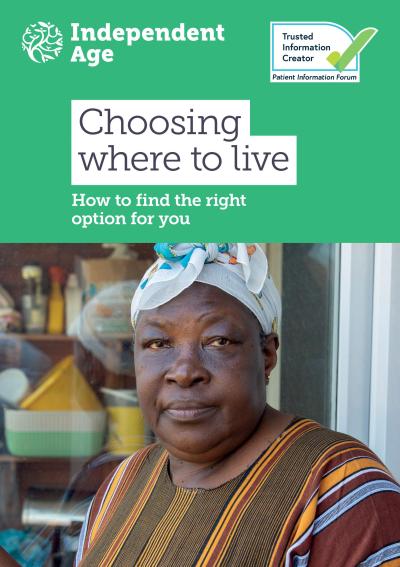Related publications

An increasing number of older people are renting privately. You might find there is more housing of this type available, but there are things to consider. Bear in mind that private sector rents are often high and can increase each year.
You can find accommodation to rent from a private landlord by:
If you can, you should always try to see a property in person to get a feel for the home and the area before you decide to live there. It’s a good idea to bring someone along when you visit properties, although the final decision should be yours.
The tenancy agreement is the contract between you and the landlord – make sure you check it carefully. You could also consider taking it to your local Citizens Advice for a second opinion. An agreement should usually include:
There are also legal obligations that may not be set down in the written tenancy agreement. For example, your landlord must carry out certain repairs, and you must pay your rent on time. Shelter has more information about tenants’ and landlords’ responsibilities.
Moving can be expensive. You’ll probably have to pay a deposit to the landlord or letting agency before you can move in. This is usually equivalent to no more than six weeks’ rent.
If you have an assured shorthold tenancy that started after 6 April 2007, the landlord must place your deposit in a government-approved deposit protection scheme. The landlord should make it clear to you that they have done this within 30 days of receiving your deposit and tell you which scheme they have used. The schemes are designed to keep your money safe and make sure you get back what you’re entitled to at the end of the tenancy.
Make sure the landlord or letting agent creates an inventory when you move in, and that you agree with what it says – the inventory lists everything in the property and describes what condition it is in. You can also take photos of the condition of the property when you move in as evidence – make sure you write down dates and descriptions of any faults. When you leave the property, the inventory will be checked and the landlord can make certain deductions from your deposit, for example if the property has been damaged.
As well as the deposit, you will usually have to pay your first month’s rent in advance.
If you’re renting through a letting agency, you can no longer be charged for services such as references, credit checks, administration, or check-in and check-out inventory.
If you’ve been getting certain benefits, including Guarantee Pension Credit, for at least six months, you may be able to get an interest-free Budgeting Loan to help with the costs of moving, such as rent that needs to be paid in advance. You can’t use a Budgeting Loan to pay a deposit. You have to pay back the loan – repayments are taken automatically from your benefit payments. Gov.uk has more information on Budgeting Loans.
If you’re getting Housing Benefit and you have some unexpected costs, you might be able to apply for a Discretionary Housing Payment (DHP). These payments aren't usually for rent but can be granted to help with certain other housing costs, such as a tenancy deposit, rent in advance or removal costs. Contact your local council to find out how to apply.
If you receive Guarantee Pension Credit or have a low income, you might be able to get help with your rent through Housing Benefit. You may also be able to get help to pay your Council Tax through Council Tax Support. If you're waiting for more than two weeks for a decision about your Housing Benefit, your local council can make a one-off payment.
For more information, read our factsheet Housing Benefit.
If you’d agreed to rent your home for an initial fixed-term period, you have various options when this ends:
If your landlord wants you to leave at the end of a fixed-term period, they’ll need to give you notice in writing.
When you move out, your landlord should contact you to explain any deductions they propose to make from your deposit. They can only make deductions for certain things, including:
They can’t make deductions for normal wear and tear, such as worn carpets or small scuff marks on walls. Shelter has more information about what deductions your landlord can make.
If you and the landlord agree on the amount to be returned, your deposit should be refunded within 10 days if you’re an assured shorthold tenant. If you disagree about how much should be returned, your deposit will be protected by the deposit protection scheme until the matter is resolved.
Contact the deposit protection scheme your landlord used for advice on what to do if you can’t get your deposit back and you want to raise a dispute. If you think any deductions are unfair, you can challenge this through the scheme’s free dispute resolution service. Your contract should specify which scheme they used. If you need more information on the steps you should take to raise a dispute and get your deposit back, visit Shelter.
You can make a complaint about your landlord or letting agency, for example if they’re not carrying out repairs they’re responsible for. Your landlord may have a complaints procedure you can follow. Otherwise, write them a letter. If they don’t deal with your complaint or you’re afraid they may evict you, get advice – you can search for a local housing adviser through Shelter.
If a letting agent manages your home, you can also complain to them. If they don’t deal with your complaint, you can complain to the letting agent redress scheme. Shelter has more information about this.

By calling Independent Age's free and impartial Helpline, you can get information and advice from one of our friendly advisers, or order our free guides.